MENNO VON BRUCKEN FOCK
ROBBIE VALENTINE, Androgenius
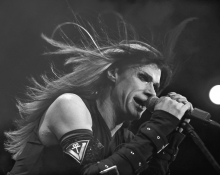
About twenty years ago, Robert Kempe, born in Hilversum (the Netherlands) decided to quit school because after hearing Freddy Mercury with Queen he knew that he had to become a rockstar! Fortunately his parents decided to support him in every way and so he actually became an accomplished musician. Between 1990 and present time he recorded nine studio-albums. The last one called Androgenius was released recently. It is a double album and in fact a collection of reworked songs, already released either in Japan only or in a different version. After years of relative silence, especially in his homeland, Robert tries to get on solid ground again with his music and with this ‘alternative best of’ he seems to gather a lot of new fans. His catchy and very melodic rock songs are filled with refined vocals, beautiful choirs and a lot of them have somewhat autobiographic lyrics, emotional and straight from his heart. Let’s take a closer look at this in Europe and the USA underestimated musician and travel back twenty plus years and let’s find out how Androgenius came to be.
Hi Robby, in the first place congratulations with your new album Androgenius with for the Netherlands and Europe a fair number of new songs. How did you choose this title? I presume it has something to do with androgen and genius?
"That’s correct. It’s no secret I like androgynous men like Freddy Mercury, David Bowie, Brian Molko (Placebo) or Nick Rhodes (Duran Duran) and I like to present myself as such as an artist. If you mingle androgynous with genius, the outcome is obvious."
The CD release party at Cultuurpodium Boerderij (Zoetermeer, teh Netherlands) was quite astounding. How did you enjoy the show on stage and how were the other shows?
"Well, you know, nowadays you have to do a lot of things yourself before you get a show like this on the road. Luckily I have a number of people helping me, but still it was very stressful before and also during the show. I’m very glad everything went really well, but even after the show I kept on thinking about things that had to be taken care of while the show was already history! So I couldn’t enjoy this performance as much as I would have liked to, but looking back I’m really proud of both the band and myself and I can honestly say I’m content. Show after show I’m getting more relaxed. We didn’t play together as a band that many times, you know."
It strikes me that your voice is now sounding a bit nasal. Did you have some hay fever problems or related problems again?
"I’m afraid so. This last month I’m struggling with some kind of inflammation of my throat. Nose and ears are a chronic problem for me, as always I have to watch out for myself, don’t push myself too hard. Last week I played in the band of my girlfriend Marlies Schuitemaker called Anyday and this band was supporting Valentine and believe it or not, it doesn’t come easy doing two gigs on one evening, being just over forty!"
Travelling back in time now. Only the first albums were released in Europe and then the following albums only in Japan. Why was that?
"The first three albums were on Polydor, so on a major record label. Especially from the third album on, we got much attention in Japan and people were eagerly interested in our stuff. We were offered a very attractive contract, more than enough to make a living, so we decided to take that opportunity, while all major labels in the Netherlands were only prepared to make a deal including Japan. Besides, in Japan we had a fair share of artistic freedom, we practically could do whatever we wanted, while in Europe the record company tends to interfere and tells artists which songs are to be put on a record! So we stuck to this Japanese deal and we actually were a bit too arrogant to consider a minor record label to release Valentine-records in the Netherlands and Europe. Looking back, I would have preferred to choose a minor label instead of not having released Valentine-records in Europe at all. In the nineties, we ended up making a record now and then and do a little bit of promotion in Japan and doing a tour there and the rest of the year there was nothing left to do. Especially for the members of the band this was frustrating. The market in Japan wasn’t big enough for more than a short tour and having been married to a Japanese girl, I learned how that market changed. In the eighties bands from outside of Japan were selling millions while from the mid nineties on, far more of their own acts gained popularity very quickly. For example a Japanese top-act would sell something like five to six million records while artists like Madonna or U2 would sell nothing more than one or two hundred thousand records! In our heydays we would sell about eighty thousand albums which is cool, but sales were diminishing with each record and the Japanese didn’t like me living in Japan with my wife, which I did for a period of three months: they’d prefer me living in teh Netherlands because that appeared more exclusive."
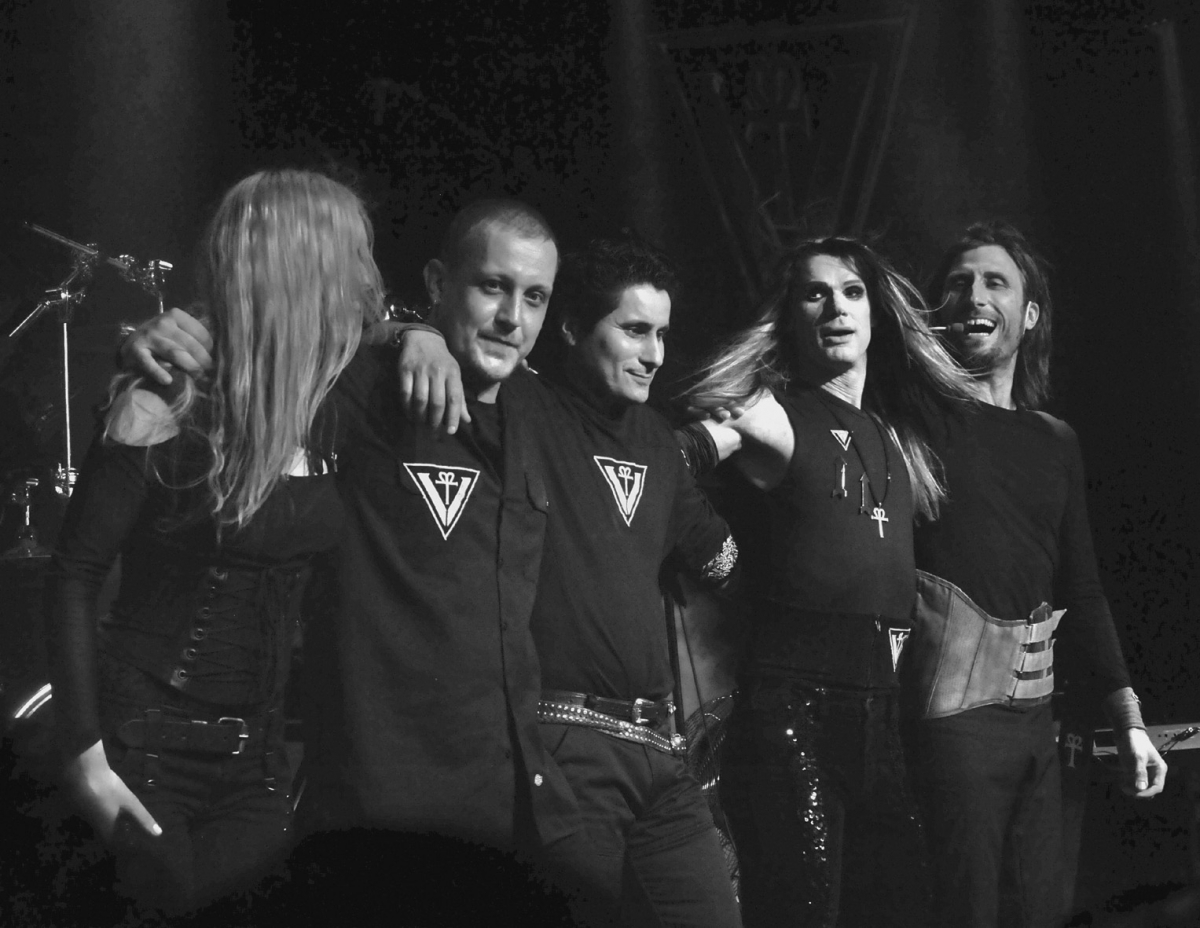 I understand you are considering to re-release the Japan only releases via your own label?
I understand you are considering to re-release the Japan only releases via your own label?
"Yes, I’m still thinking about that. It would be nice to have them rereleased with the addition of several bonus tracks to make the album even more of interest. Actually I thought of this idea before I decided to do Androgenius because otherwise it would be a bit of overkill. Still there are many good songs left that didn’t make it on to Androgenius. I agree, it would be a shame not to release all those other songs for the European market. There are a lot of possibilities such as adding live tracks, bonus material and you could even decide to make such a rerelease only available at your shows. People attending would have an opportunity to buy something unique. That might be a nice idea, I’ll keep that in mind, but let’s see what will happen with this record first shall we?
How did you choose the tracks for Androgenius?
"Basically my own feelings combined with finding the right balance between the kind of songs and foremost which songs I wanted to perform live. That was the most important consideration. Unfortunately there were too many songs for the second CD (Past), so I had to switch a few songs to Future, which was supposed to contain only the slightly heavier songs."
Didn’t you consider to come up with a whole new album?
"Yes, I did at first. I wanted to make a more heavy album with heavy guitars and choirs. Due to the fact I’ve been giving a chance to perform live in May last year. At that time I had a band put together, ready to go on the road. If I would have decided to write an entirely new album, the recordings and production would have cost us at least a year. I didn’t feel like waiting, didn’t have an urge to plunge into a studio right away and I desperately needed to play live again and I really wanted to play those songs, which ended up to be on Androgenius. Before the few shows in 2008 it was twelve years ago Valentine performed live!"
In your lifetime you’ve had several relationships and each time you suffer the pain of a broken relationship. That’s the period your creativity is at its peak! How are things at the moment?
"Well, here’s a little dilemma I’m afraid. As a human being I am very happy, but as an artist there is nothing much going on creatively. This is somewhat a contradiction right? Fact is I’m creative when I’m feeling the agony of a lost love, but maybe I will ‘learn’ to write good songs even when I’m happy!"
Since your first album, along the way you have taken more control over the whole process of recording, producing and mastering. Did you specifically aim at gaining full control or were there other reasons why you ended up doing everything by yourself?
"Bottom line is: I like to have things done my way, but if someone else can do a better job, I’m more than happy to let him or her do it for me. For Over And Over Again I was glad I had good advice from the American producer Humberto Gartica and the sound John Sonneveld created for No Turning Back was amazing. I never could have done that myself. But on the other hand I’ve had so many disappointing experiences like for example the disapproval of the mixes for my third album. Also disappointing were the results of well-paid sound engineers for the fourth album. That’s when I ended up using my own 16–track demos instead of their costly product. For the next album I used up a good part of the budget to modernize my own equipment to be able to do a better job in my home studio."
With Over And Over Again you had a major opportunity to score a big hit in the states, but your wish to stay true to the image you created. Did that turn out to be a major obstacle for further success?
"Indeed. The American branch of the record label had Humberto Gartico flown in to produce just that song. The new president of the label didn’t think my image fitted that song properly and if I had given in and would have changed my appearance and image by wearing jeans and restyling my hair, it might have been that Humberto would have been available to produce the whole album instead of just one song and the next album would have been done by top of the bill producers as well. My stubbornness gave a lot of tension in the band as well. At first they backed me up because I have brought them a certain level of success, but when they saw this opportunity go down the tube, they began to feel differently. Of course I understood how they felt, but it felt like treason at the time."
Looking back at your education as a pianist, you started by listening to your mother playing Chopin and Mozart. Now you have recorded a piano solo piece from works by Chopin and Tchaikovsky. How long did you take piano lessons? Did you ever consider to try the conservatory?
"I began playing the piano at the age of six and I had a good teacher in classical music, then a teacher who was an older guy mostly interested in jazz, so not my first choice and I almost lost interest. Between the age of seventeen and twenty-three I had a very good teacher again and practiced for several hours each day. After Over And Over Again became a hit, my life was getting too complicated and busy and that’s when I decided to quit taking lessons. When I dropped out of school I couldn’t even hear the word school anymore and although my parents and I went to the ‘open house’ of a conservatory I was very disappointed finding out it was a sort of school also: thus not an option for me!"
So you never finished your secondary school. Did you ever regret this decision and how do you write all those lyrics in English?
"The answer to that first question would be ‘no’! What use would I have for a mavo-diploma (lower level secondary school), because I wouldn’t have done anything beyond that anyway! Furthermore I think most of my English comes from watching movies, listening to records. The Japanese girl I married spoke American English fluently so that pushed me into the right direction. In those days there was someone else checking the lyrical content, but for the Japanese releases I kind of let it slip…who cared?"
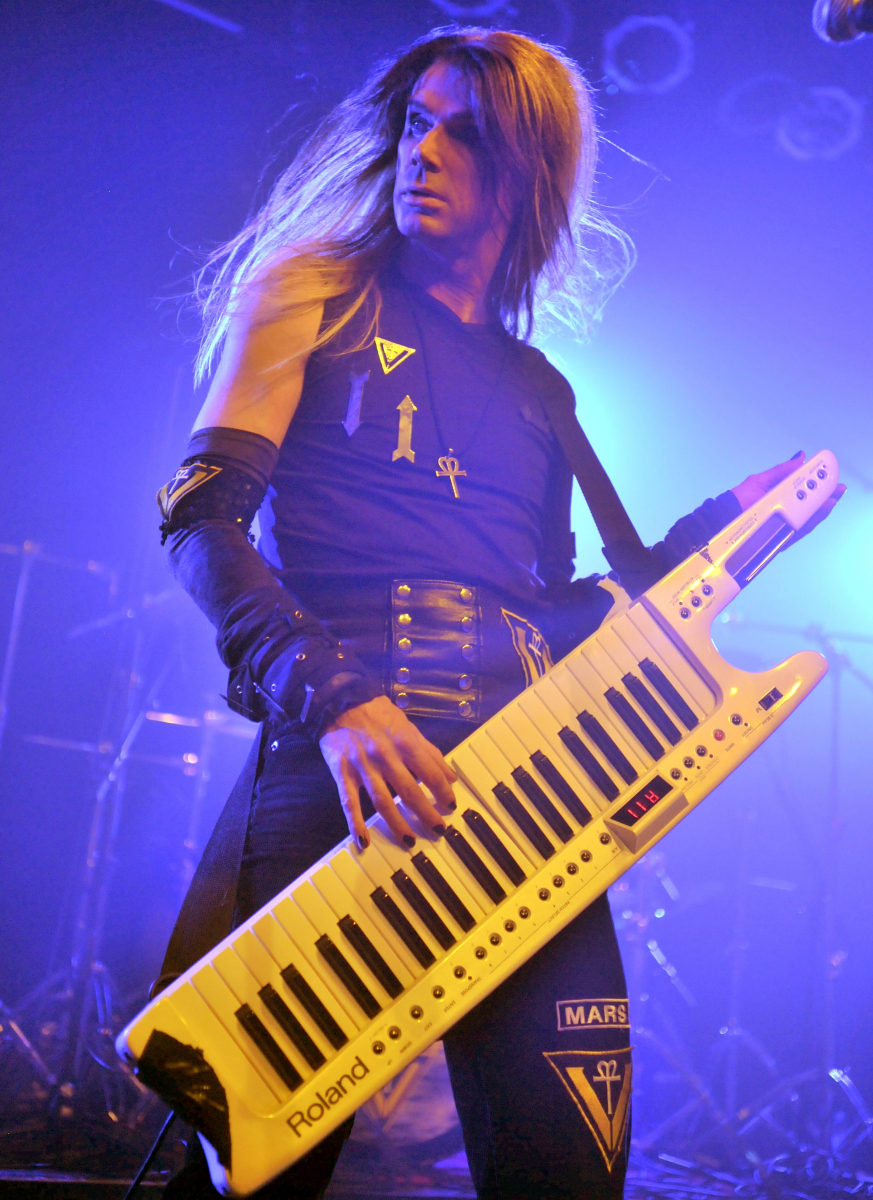 When did you develop an interest in other instruments and keyboards?
When did you develop an interest in other instruments and keyboards?
"I think I started playing acoustic guitar in early childhood and from nine years of age I got my first electric guitar. Being a fan of Queen and other rock bands, I had to learn how to play that stuff. I fiddled around with a snare drum and a bass guitar from early teens on as well. When my mother bought an organ I wasn’t too interested at first, but it inspired me to save every penny and finally I bought my first electronic keyboard: a Hohner clavinet. At the age of fourteen I bought a Roland Juno 6, but this keyboard didn’t have a memory like its bigger brother Juno 60. So when I started playing in a band I had to work hard to set all the switches right in time for the next song and had to memorize all those presets."
What kind of gear do you use at present to record all those different sounds from the keyboards?
"In 1996 I bought a fairly huge mixing table and since then I tend to use that one still, in spite of the fact I am aware of the possibility to use a computer instead. The same happened with drums. I’ve always used a drum machine to record the drums for my demos, until some four years ago, I had the urge to try a new hobby: playing drums! I had this multi-track MD recorder and that’s how I recorded, bass, guitars, keys, vocal and choirs. I channeled the different instruments and voices through different amps and started to play along on the drums."
How do you compose? Do you write all notes down?
"Of course I can read notes and I could write them down but that is a lot of work. Usually I use little cassette tape recorders whenever I have a vocal line or a piece of piano. With those recordings I keep on adding instruments and vocals in my head before I think a song is actually ready to record a demo."
Out of improvisation a track like I Can’t Get Over You came to be. How did this occur?
"I was in the studio and I finished recording, but the sound of the piano at the time was so cool I just had to play on. In less than fifteen minutes this song was created. The lyrics I added afterwards."
Have there been any changes in your approach to the process of composing until the recording has been completed?
"Creating a new song I still do the old fashioned way, but the recording process has changed dramatically. The somewhat slow ADAT-recorders, linked to each other have been replaced by the much faster hard disk recorder, but until now I refrained from using computer software. I know it’s much easier and faster and you can adjust things far more easily but at present I’m the kind of guy who’s happy to know how to send an email! I realize I have to change because it would be a great help for recording a new album!"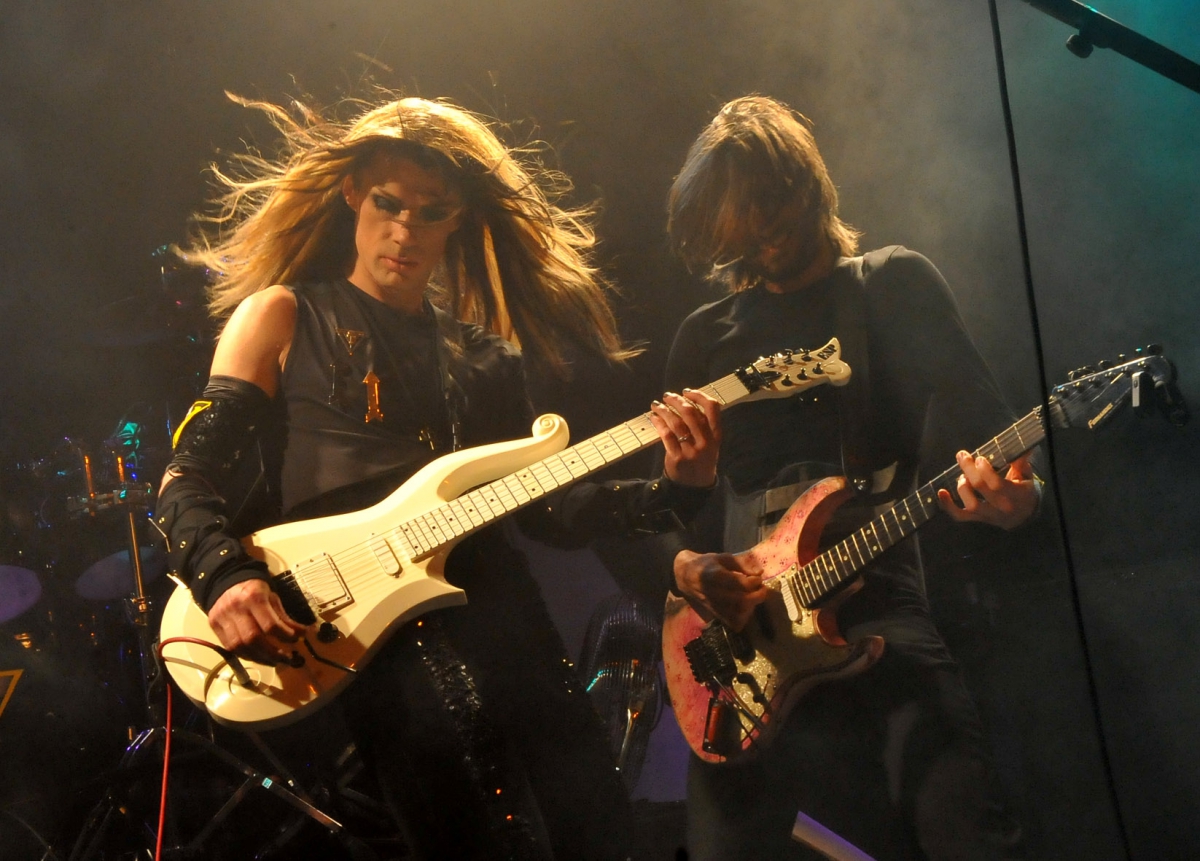
Your white ESP guitar used on stage reminds me of the model Prince uses in Purple Rain. What’s the story behind this guitar?
"You’re right: it is the model Prince used to play. After him the Japanese guitarist Sugizo had ESP make a whole series of guitars and that’s where I eventually found one. I’m still looking for a black one as well, but this is my only Prince Cloud guitar so I cherish it!"
A lot of your music has been inspired by Queen, but you also mention names like Tori Amos, ELO, The Beatles, The Eagles and Nik Kershaw. What kind of music do you dig at the present day?
"Mm, nothing much really, although I do like Thirty Seconds To Mars: good singer, in fact he’s an actor with an awesome voice, and really good songs! Sometimes I like Linkin’ Park and Korn.
As a fan of Freddy Mercury, you would probably not be very enthusiastic of Queen plus Paul Rodgers, who split up recently by the way. Rodgers is reuniting with Bad Company but do you have any idea what Brian May and Roger Taylor will do?
"No, I agree. I didn’t like that combination at all. Their last album is merely a simple rock album led by Paul Rodgers and it just shows how big the influence of Freddy Mercury was. I missed teh harmonies of Brian May and the choirs with Roger Taylor as well. Op Back Into The Light there are some great melodic songs such as Too Much Love Will Kill You, a truly terrific song. I have no idea what Brian and Roger will do next. I kept in contact with Brian until about seven years ago, but I felt a bit like a hypocrite sending him my albums while I couldn’t be enthusiastic about what they were doing with Queen! I think they should have stuck to a line-up doing the vocals themselves."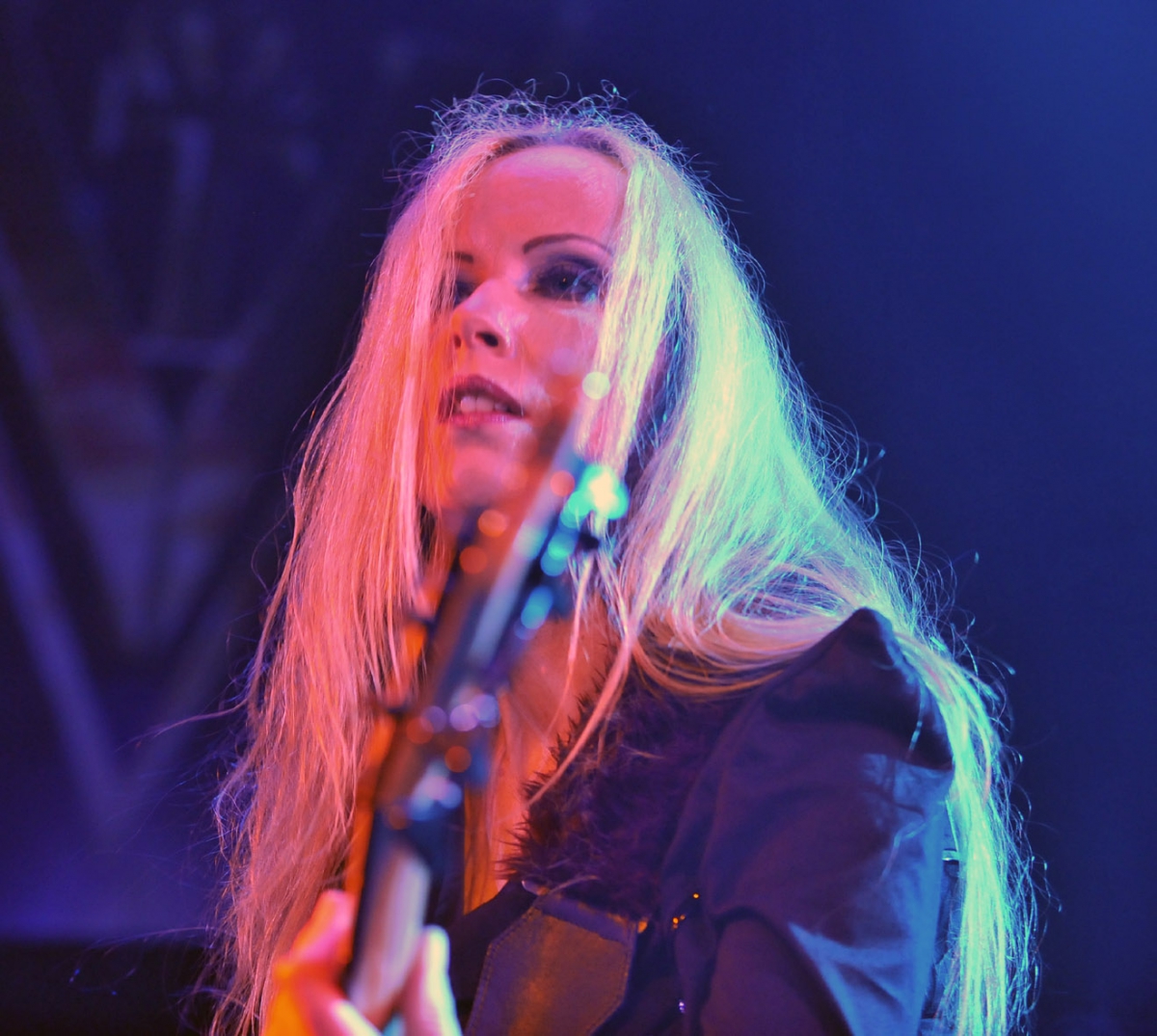
Your image, using eyeliner, make-up and coloured nails seems to me like a crossover between Freddie Mercury and Michael Jackson. Did you consider changing that images drastically in the new millennium?
"No, I didn’t want to change that image at all. It’s just who I want to be on stage. I think I look a bit tougher due to my more matured age, but I’ve always felt music and show go together, so wearing a special outfit, use some make up etcetera. I feel it’s an outrage to play on a podium in your daily outfit! Most prog acts are the champions: fat beards, worn out T-shirts so virtually no show element whatsoever! I can’t imagine people really fancy to watch guys like that on stage. In the nineties my presentation seemed to be outdated or just not ‘cool’, I just to be a some sort of outcast, but nowadays I get only positive feedback from fans. I admit I selected the members of the band with that images in the back of my head: our guitarist Cyril Whistler is probably an even more weird guy than I am! If you let him do what he wants, he would put on all sorts of make up! Then there’s Liselotte Hegt, a beautiful woman, with gorgeous make up and a both forceful as well as mysterious charisma."
Talking about your band: can you describe how exactly you made contact with each member?
"Cyril and I go a long way back, from the early nineties to be precise. I got his acquaintance via our bass player at the time, Arthur Polini. He was friends with both Jusso and Cyril and that’s how I met him. I’ve always wanted to play live with him and fortunately this wish turned out to be mutual. Liselotte Hegt I met because I was asked to play keyboards for Dial. Although I was too occupied at the time to actually play with them, my attention was drawn to Liselotte immediately. André Borgman was brought to my attention via Joost van den Broek whom I did a project with. He told me André loved my music and suggested I should ask him. At the time After Forever were having a sabbatical, later a break up so he had the time and was eager to accept the job!"
What kind of project did you do with Joost?
"We’re talking about some four years ago here, when Joost mailed me. He had the idea to form a sort of G3 on keyboards. We couldn’t call it K3, because of the famous all girl band, so it became KX3. He also asked Keiko Kumagai (Ars Nova) and we actually made some demos, but unfortunately the project never saw the light of day."
Your album The Most Beautiful Pain was released in 2006 having been put away on a shelf for nearly 2,5 years. Any idea why it took so long?
"I guess it’s more or less the story of my life. It happens to me all the time that some finished product of mine is stowed away for months or even longer. Of course it was ready to be released for the Japanese market to fulfill my contractual obligations, but again there were some changes in the board of the record company and they just kept on postponing the release date. Eventually it was released in Europe via Frontiers Records and probably that’s why the Japanese decided to release that album after all. I regret to say that I had a much more interesting deal with Frontiers for more albums, but in my opinion that company didn’t keep their promises to me, so I decided I’d better not work with them anymore. At the time I had to play the role of being my own manager and I didn’t act as swiftly as I perhaps should have done. In the mean time The Most Beautiful Pain was released and presumably the sales were less than expected and so they suggested to change the contract and of course my point of view is: a deal is a deal! Well, that’s in a nutshell what happened."
During you current live show Cyril Whistler plays a violtar. What’s the story behind this instrument?
"Cyril has been working on that instrument for about twenty years. It is actually an electric violin with frets to make it more accessible for guitarists to play it. You can plug it in any guitar amplifier and use all guitar effects too. It’s a newly designed instrument and I hope for him it will be a success commercially as well."
Lanvall (Edenbridge) is the one who introduced you to Frontiers Records. How did you and Arne 'Lanvall' Stockhammer meet each other?
"Lanvall contacted me a few years ago because he was a fan of my music. He asked me to play a few parts on some of studio albums of Edenbridge. I agreed so he came over from Austria to records these parts and that’s how I met him."
At the beginning of this new millennium you were busy with several projects outside of Valentine: Kyssmet and albums with Valensia. The last one with the title NYMPHOPSYCHOSCHIZOPHONIC was never released. Can you comment on these projects?
I wanted to play bass in a hobby-band and I started to write some songs. The lovely Alyss Andico from the Philippines was the designated singer, but at some point she took off and went back to her homeland. A few years later Marlies Schuitemaker approached me and asked me if I had some songs for her. I started writing because it felt good to work with her and then she asked me if I had more songs. Knowing this Kyssmet project wouldn’t work, I suggested Marlies to use these songs and they worked out great for her. That was the start of the band Anyday. With Valensia, there was a record deal for three albums. The third one was never released. After the second album Valensia and I disagreed on a number of things and there was little to no contact between the two of us. The material he was to use for our third album ended up on his Metal Majesty album and when we finally came together and became friends once more it was only a month before the deadline to come up with the third album. Valensia submitted his Metal Majesty stuff anyway and I couldn’t come up with anything better than a few demos. So we fulfilled the contract to avoid a law suit but fortunately that album was never released. Nevertheless it made us some money to pay the bills!"
What’s your status in Japan at present?
"Well, I don’t know really. Androgenius was released in December 2008, but I never got feedback until this day so my guess is that it’s not doing so well. On the other hand I must admit it’s a sort of ‘best of’ album in Japan, while in Europe it’s practically ‘brand new’!"
Since you’ve been around for about twenty years in the music business now, you must have had some memorable highlights in your career as well as some major disappointments. Could you name of few and comment on those?
"Yeah, sure! One evening I will never forget: March 26, 1996. The road to being a pop or rock star had been difficult with all kinds of mischief, quarrels and agonies but that night in Tokyo made up for it all. It was the first show with my new band at the time (Vinnie, Juan, Giovanni and Bert) and the audience went crazy and sang along knowing all words of the lyrics. I hardly could sing a note for three songs, because of all the emotions! I’ll never forget that night. Then there are of course the live shows with Brian May, especially the first one. And…that may seem a bit strange perhaps, the recent show in Cultuurpodium Boerderij! The great band I have now, the logos, the banners, it all seem to come together so perfectly that I felt very proud that evening and for me it‘s one of my highlights already. I hope the DVD that will be released in due time will be awesome, for I’ve never released a live show on video or DVD so far. One of my major disappointments was the passing away of my dad. He was only 57 and I just finished the video for I Believe In Music and all of a sudden I got this terrible message on fathers-day mind you! It’s almost twelve years ago now and my mother is still trying to overcome this blow. Having to sell my house when things weren’t looking too bright was another major disappointment. The rampage love stories you have read on my bio no doubt!"
What are the plans for the near future?
"We have a number of options for live shows, but these are not confirmed yet. What we need is some good airplay! I will start mixing the multi-track of the live show in Zoetermeer soon and my plan is to finish writing material for a new album by the end of 2009. We should be able to play some of the new stuff live by then. It would be great to have an opportunity to tour Europe and Japan, but so far it seems only wishful thinking! The music industry is very difficult at the moment and sometimes I feel it’s a sort of lottery: if you are lucky you succeed and if you are not you’re history…"
Discography (selective):
Robby Valentine (1992)
The Magic Infinity (1993)
Valentine III (1995)
Valentine 4 United (1997)
No Sugar Added (1998)
Believing Is Seeing (2000)
The Most Beautiful Pain (2006)
Falling Down In Misenthropolis (2007)
Androgenius (2009)